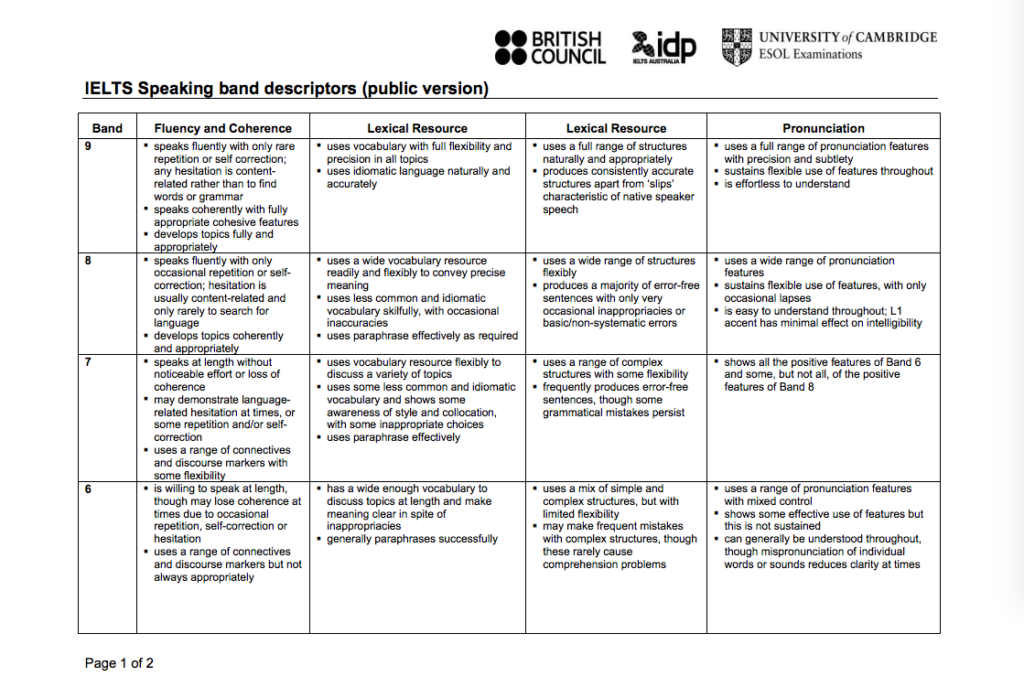
IELTS Speaking Part 2

Tips, Topics, and Techniques
IELTS Speaking Part 2
This part of the IELTS Speaking test assesses how well you can talk for an extended period of approximately 2 minutes. It is the same for General and Academic IELTS.
You might think 2 minutes isn’t a long time, but if you’ve never done it before, it can seem like forever! So timed practice is key.
What happens in IELTS Speaking part 2?
The examiner will give you a cue card with written prompts which you should cover in your talk. The card will ask you to talk about a particular topic, which will be related to personal experience, for example, a person or place you know, an object you can’t live without or an event you participated in. You will be given one minute to take notes on the topic and then you will need to speak on the topic for about two minutes. The examiner may ask one or two questions near the end to finish this part of the test. Here is a sample of what a cue card looks like:

IELTS Speaking Part 2
How will my response be scored?
The examiner will assess you on:
Fluency = 25%
Vocabulary = 25%
Grammar = 25%
Pronunciation = 25%
To get a high score, this is what you must achieve in these 4 areas:
Fluency and Coherence: You should speak fluently with occasional hesitation for language or ideas. Your talk should be coherent and well-structured. It should also be relevant to the topic given.
Lexical Resource: You should use a wide range of language appropriately with some idiomatic language (some mistakes are accepted). Your vocabulary needs to show that you can talk about a variety of different topics.
Grammar: You should demonstrate a wide range of grammatical structures with minimal grammatical errors. For example, a range of different tenses, comparative forms, relative clauses, conditionals, the passive voice and compound or complex sentences.
Pronunciation: You should show strong ability to use intonation (rise and fall of the voice), word and sentence stress and the way you pronounce words should be clear and easy to understand and you should speak at a natural pace.
Typical IELTS Speaking Part 2 Topics

IELTS Speaking Part 2
Top tips for IELTS Speaking Part 2
1. Make notes before you talk
The examiner will give you one minute to prepare your talk. Use this time to write down some clear notes so that you don’t have to think too hard while you’re talking. Don’t write full sentences as you won’t have much time. Instead, write down a list of words related to what you want to say, or draw a mind map or other similar diagram to guide you. Your notes can also help you to avoid panic and forgetting what to say.
2. Use a good opener and paraphrase the topic
Starting your talk can be difficult, but it doesn’t have to be if you know how to use a good opening phrase. A good opener will impress the examiner!
Here are some good examples:
- “I’d like to/I’m going to talk about…”
- “Well, there are a few _______ I can think of, but I guess the most memorable one was….”
When introducing the topic, try to paraphrase and not use the exact words from the cue card. Paraphrasing shows your command of vocabulary and grammar. For example, if the topic is: “Describe a memorable event that you recently attended.” You could paraphrase this and say:
“I’m going to talk about an unforgettable party, which I had the pleasure of being invited to just last month.”
3. Maintain a good pace
Try to speak at a steady, natural pace. DO NOT speak too quickly or too slowly as this can negatively affect your band score for pronunciation. If you speak too quickly it could be difficult for the examiner to clearly understand what you’re saying.
4. Decide what to talk about quickly
Sometimes it’s difficult to think of something to talk about. If you’re struggling, then make up a story. You won’t be assessed on whether or not your story is true, what matters is that you can demonstrate to the examiner a good level of overall fluency and coherence and can a good command of grammar and vocabulary.
5. Give sufficient detail
Avoid simply answering the prompt questions quickly. It is important that you add detail to these questions. Adding details to each prompt is a way of demonstrating your overall language ability. Using descriptive vocabulary and talking with feeling will help to boost your score. For example, if your topic card includes these points:
- Who this person is?
- How long have you known him/her?
- What qualities he/she has?
Start by giving some background about this person (age, relationship, nationality, job, where he/she lives). Say how long you’ve known him/her and also talk about how you met this person (when, where, in what situation). Finally, the qualities can include physical qualities such as abilities (sports, speaking languages, giving good advice etc.) and qualities of character (outgoing, friendly, kind, ambitious, adventurous) and give one or two examples of these.
6. Use a range of vocabulary that you know well
Using unfamiliar words can increase your chances of making mistakes. Learning new words very soon before your test may mean that you use them inappropriately in the exam. It’s important that when you are learning English words, you learn not just the word itself, but its collocations and examples of how the word is used in the right context. Do your research!
7. Don’t memorise answers
The examiner will pick up on this! Memorised responses don’t give the examiner an accurate measure of your English language skills, and secondly, memorised answers could influence your final band score in a negative way.
How to prepare?
1. Take a private course with an experienced teacher
The best way to prepare is to practice with an expert who can guide you on how to structure and organise your answer and give you tips on how to improve.
You can also practice on your own. Try to practice various common topics for this section of the test for a period of 2 minutes and record yourself. You could also get your native English friends listen and check for you.
2. Take notes like a pro!
You should practise taking notes regularly by using sample questions for part 2 and timing yourself for 1 minute. Try using different techniques: bullet points, mind maps and spider grams. If you practise brainstorming/note-taking every regularly, you will start training your brain for thinking, writing and speaking in English. Without planning, it is likely that you will end up describing a general aspect of the question rather than covering all of the specific parts and this could lead to marks being lost. If your talk isn’t organised, you might also lose marks. The point is, don’t just practise speaking, but also practise taking notes for 1 minute before speaking.
3. Watch some videos
The British Council and IDP have created some useful videos of candidates taking the IELTS Speaking Test. We recommend you watch these and listen carefully to the answers given by high level candidates. In particular, listen to candidates just above the level you are currently
at, or at the level you are targeting. Therefore, if you are aiming for a Band 7 in Speaking, don’t listen to a Band 9 candidate; listen to a band 7 or Band 8 candidate.
This video features a performance of a high-level candidate: Video link
This candidate scored high because:
- His speaking is fluent
- He showed confidence and came across as relaxed
- He spoke without being conscious about his English
- Minimal grammar mistakes with a range of grammar structures
- Very appropriate and effective English vocabulary
- He directly answered the question
Check out our blog on how to Maximise your IELTS Speaking Test Score for more useful tips. Aurora World Education offers preparation courses for IELTS, CELPIP and PTE exams with experienced native teachers. Contact us to find out more.



